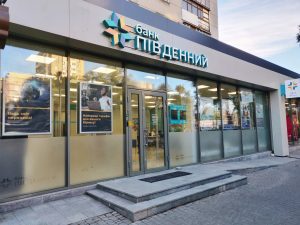
The net profit of Bank Pivdenny (Odesa) in January-March 2020 amounted to UAH 30 million, which is 63.68% less than in the same period in 2019 (UAH 89.59 million), according to the quarterly bank statements.
According to the report posted on the bank’s website, net interest income for the first quarter of 2020 amounted to UAH 361.28 million, which is 2.8% more than for the first quarter of last year.
In January-March 2020, the bank’s assets increased by 1.7%, to UAH 27.14 billion, including loans to customers by 18.9%, to UAH 15.53 billion.
The bank’s liabilities since the beginning of the year grew by 2.1%, to UAH 24.35 billion, including obligations to customers by 4.7%, to UAH 20.54 billion.
The bank’s net worth in January-March 2020 decreased by 1.7%, to UAH 2.79 billion.
The charter capital remained at the level of UAH 1.34 billion.
Bank Pivdenny was founded in 1993.
National bank of Ukraine’s official rates as of 06/05/20

Source: National Bank of Ukraine

Milkiland, a dairy group with assets in Ukraine, Russia and Poland, received EUR 11.6 million in net loss in 2019, which is 41.2% less than in 2018.
According to the group’s annual report on the website of the Warsaw Stock Exchange, its revenue fell by 5.2%, to EUR 125.76 million over 2019.
The gross profit of the group compared to 2018 decreased by 15.6%, to EUR 16.46 million. Milkiland increased its operating loss by two times, to EUR 20.44 million in 2019.
The group’s EBITDA decreased by 72.2%, to EUR 585,000, EBITDA margin was 0.5% in 2019 compared to 1.6% in 2018.
The company’s net liabilities decreased by 10.4%, to EUR 76.71 million by the end of 2019. The total assets of the company increased by 17% and as of December 31, 2019, amounted to EUR 177.81 million.
The revenue in the segment of whole milk products decreased by 11%, to EUR 57.64 million in 2019 compared to 2018 (46% of total revenue); in the segment of cheese and butter by 17%, to EUR 42.11 million (33%); in the segment of milk powder and other products increased by 52%, to EUR 26 million (21%).
The Russian market generated 57% of the revenue of Milkiland, the Ukrainian market had 40%, the Polish market had 3% in 2019.
The company said in the statement that in 2019 Milkiland, on the one hand, increased the presence in export markets, on the other, experienced difficulties caused by adverse changes in the macroeconomic situation, as well as the difficult situation in dairy markets in the main countries of operation.
In particular, Milkiland continued its expansion into the Chinese dairy market, supplying dried milk products to this country. The group also supplied kosher dairy products, such as dried milk products and butter, to Israel.
In the dairy market of Ukraine, the company faced rising costs for raw materials amid rising prices for raw milk at farms (8% more on average in 2019 year-over-year). According to the company, this trend, as well as the revaluation of the hryvnia to euro, led to the fact that, as of December 31, 2019, prices for raw milk in Ukraine were 19% higher than in EU compared to the beginning of 2019, which provoked a sharp increase in imports of dairy products (48% year-over-year), primarily from EU to Ukraine.
Milkiland said that imports put pressure on Ukrainian manufactures, especially cheese producers, and many of them were on the verge of zero profitability (cheese imports increased by 73% in 2019, compared to 2018).
Milkiland intends to complete the process of changing registration by the end of August 2020.

The volume of construction work decreased by 12.8% in Ukraine in March 2020 compared to March 2019, whereas in February 2020 by 3.8% compared to February 2019.
The State Statistics Service said that the volume of construction work has reached UAH 26.1 billion from the beginning of 2020. In general, that indicator decreased by 5.5% in the first quarter of 2020, compared to the same period in 2019.
The statistics service said that the indicator increased by 28.2% in March, compared to February (according to seasonally adjusted data, it decreased by 1.8%), while compared to January 2019, that indicator decreased by 2.7%.
The statistics service said in March 2020 that the volume of work decreased in all sectors of construction, except non-residential one in March 2019. Thus, according to unadjusted data, the reduction in volumes in residential construction amounted to 25%, in the construction of engineering structures by 12.4%. The growth in work in the construction of non-residential buildings amounted to 1%.
The share of new construction to the total volume of finished construction works amounted to 46.7%, repair amounted to 25.8%, reconstruction and technical re-equipment amounted to 27.5%.
Decrease in the volume of construction work was recorded in 13 regions, in particular in Kirovohrad (by 50.5%, to UAH 219.3 million), Odesa (by 27.8%, to UAH 1.51 billion) and Zhytomyr (by 20.2%, to UAH 267.6 million) in January-March 2020, compared with the same period in 2019.
The largest growth in construction work was recorded in Chernihiv (by 22.9%, to UAH 339.2 million), Lviv (by 15.4%, to UAH 2.03 billion) and Rivne (by 12%, to UAH 356.5 million) regions in the first quarter of 2020. In Kyiv, the volume of construction work performed during that period decreased by 8.3% and amounted to UAH 6.46 billion.
The statistical data are given excluding the occupied territory of Crimea and the temporarily occupied territories in Donetsk and Luhansk regions.

Nova Poshta Global, part of the Nova Poshta group of companies, notes a 28% increase in Ukrainians’ orders from AliExpress compared to April last year.
According to a press release, in January-March of this year Nova Poshta Global delivered over 1,000 tonnes of goods from China and the United States by air.
“AliExpress continues to be a favorite foreign online store among Ukrainians, on which not only the number of orders has grown, but also the average check of purchases. If it was $6.6 amid quarantine, now it has grown to $11.6, and the number of orders of protective equipment and medical goods, including masks, respirators, thermometers, etc., rose. But the most popular categories of goods remain phone cases, cables, chargers, clothes, shoes, underwear and dietary supplements,” Nova Poshta Global notes.
Regarding popularity among Ukrainians, AliExpress, according to the company, is followed by the American online stores iHerb, Ebay, Amazon and 6p.m.
According to Nova Poshta Global, the number of orders from customers from Zhytomyr region doubled during quarantine. However, the most active buyers from abroad remain residents of large cities, namely Kyiv, Kharkiv, Odesa, Dnipro, and Lviv.